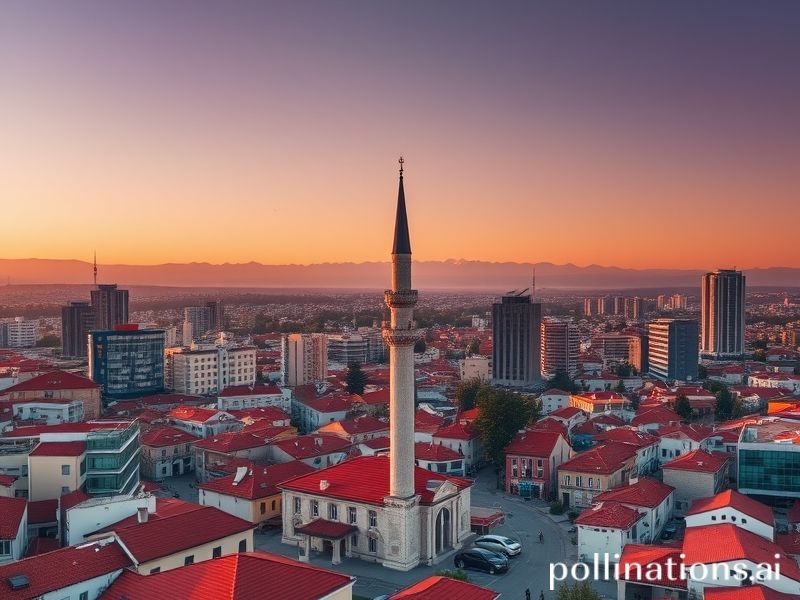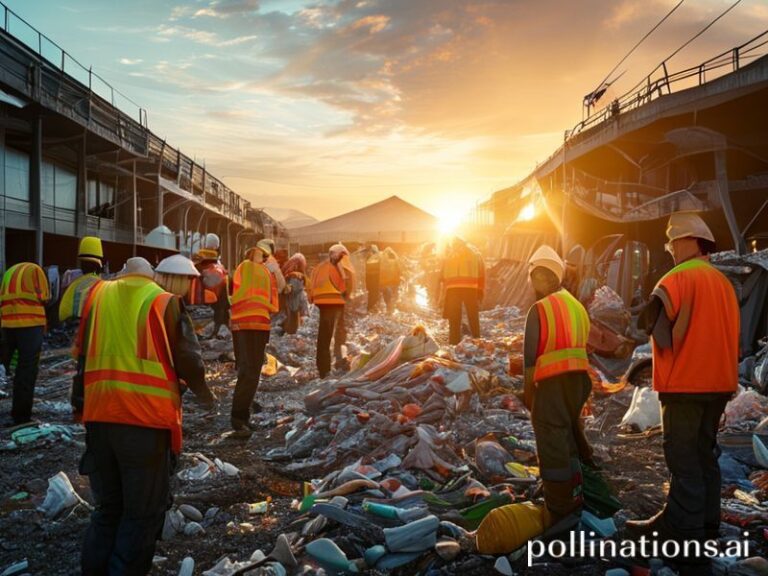Pristina: Europe’s Capital of Provisional Everything—And Why the World Keeps Checking In
PRISTINA—The capital of Europe’s youngest country is the sort of place where NATO still keeps a small museum of its own spent shell-casings and locals treat the phrase “geopolitical stability” the way Londoners treat sunshine: theoretically possible, statistically improbable. Walk the city’s main boulevard—named, with the modesty typical of post-conflict capitals, after Bill Clinton—and you’ll see teenagers who were born after the 1999 war posing for TikToks under a three-storey portrait of the former U.S. president giving the world the world-famous two-fingered peace-and-whatever-else gesture. It’s a fitting shrine for an era when salvation arrives by airlift and leaves behind a KFC.
Pristina matters precisely because almost nobody can agree why it does. To Brussels technocrats, it’s the final, mildly embarrassing loose thread in the tapestry of European integration: a state recognised by 117 countries, blocked from the U.N. by Russia and China, and still negotiating “normalisation” with Serbia, a neighbour that insists Kosovo is merely a rebellious province with excellent coffee. To Washington, it’s proof that humanitarian intervention can still come with franchising rights—hence the Clinton statue and the persistent rumour that Camp Bondsteel, the sprawling U.S. base just down the road, is America’s largest piece of real estate in Europe outside Ramstein and, possibly, Mar-a-Lago.
But Pristina is not just a geopolitical Rorschach test; it’s also a laboratory for 21st-century state-building. The city’s skyline is a collision between Ottoman brick, Yugoslav brutalism, and the glass-box optimism of international NGOs whose logos are as ubiquitous as cigarette smoke. Every new façade arrives with a plaque thanking the European Union, the Kingdom of Norway, or—on one memorable daycare centre—the Grand Duchy of Luxembourg, because nothing says sustainable sovereignty like a nursery paid for by a microstate whose entire population could fit inside Pristina’s largest shopping mall.
The locals have adapted to this condition with the weary ingenuity of people who have watched the future arrive by grant application. Unemployment hovers around 25%, yet the cafés are full because remittances from the diaspora in Germany and Switzerland flow faster than the traffic on Mother Teresa Street, which is to say glacially until someone lights a tire to protest something. Young Kosovars speak three languages, four if you count the sarcastic emoji chain they deploy when asked whether they’ll ever need a visa to visit Paris without pretending to be Albanian.
Meanwhile, the rest of the planet has outsourced its moral clarity to Pristina’s airport. Every diplomatic crisis now seems to include a quick layover here. Venezuelan opposition leaders, Afghan evacuees, and, in one surreal week, a charter of South Sudanese peace negotiators—all have touched down on the tarmac that NATO paved in record time after the war. The arrivals board reads like a fever dream of global dysfunction: Istanbul, Vienna, Dubai, and, on Tuesdays, a mysterious flight labeled “TBA” that everyone assumes is either the CIA or Wizz Air’s latest cost-cutting measure.
What does Pristina portend for the wider world? First, that sovereignty is increasingly a matter of cloud storage and lobbying budgets. Kosovo’s very existence is backed up on servers in Brussels and mirrored in Washington, ready to be rolled back or restored like a corrupted iPhone. Second, that the post-liberal order will be decorated with pop-up monuments to whichever great power happened to drop the most ordnance—or development aid—in your backyard. And third, that the next generation will grow up fluent in both Instagram filters and the fine print of Schengen visa exemptions, a skill set that previous generations reserved for nuclear deterrence.
As the sun sets over the traffic circle where the Clinton statue meets the Skanderbeg horseman—two heroes nobody quite asked for—Pristina settles into its usual evening soundtrack of muezzins, Ed Sheeran covers, and the occasional helicopter from Bondsteel practicing night manoeuvres. Somewhere in the distance, an EU-funded startup pitches an app to digitise blood feuds. The city shrugs, orders another macchiato, and keeps waiting for the world to decide whether it’s a country, a cause, or merely a cautionary tale with decent Wi-Fi.







